Serving 520 students in grades Prekindergarten-4, University Place Primary ranks in the top 20% of all schools in Washington for overall test scores (math proficiency is top 10%, and reading proficiency is top 10%).
The percentage of students achieving proficiency in math is 65-69% (which is higher than the Washington state average of 40%). The percentage of students achieving proficiency in reading/language arts is 70-74% (which is higher than the Washington state average of 53%).
The student:teacher ratio of 16:1 is equal to the Washington state level of 16:1.
Minority enrollment is 54% of the student body (majority Hispanic and Black), which is higher than the Washington state average of 52% (majority Hispanic).
Quick Stats (2025)
- Grades: Prekindergarten-4
- Enrollment: 520 students
- Student:Teacher Ratio: 16:1
- Minority Enrollment: 54%
- Overall Testing Rank: Top 20% in WA
- Math Proficiency: 65-69% (Top 10%)
- Reading Proficiency: 70-74% (Top 20%)
- Source: National Center for Education Statistics (NCES), WA Dept. of Education
Top Rankings
University Place Primary ranks among the top 20% of public schools in Washington for:
Category
Attribute
Overall Rank
Math Proficiency
Reading/Language Arts Proficiency
School Overview
University Place Primary's student population of 520 students has stayed relatively flat over five school years.
The teacher population of 33 teachers has declined by 5% over five school years.
Grades Offered
Grades Prekindergarten-4
Total Students
520 students
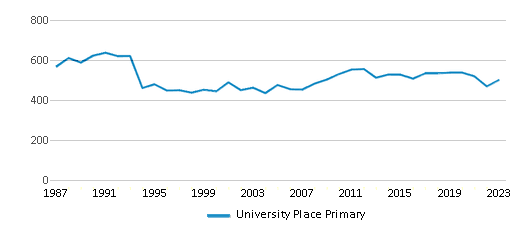
Gender %
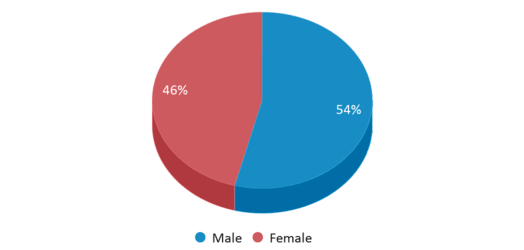
Total Classroom Teachers
33 teachers
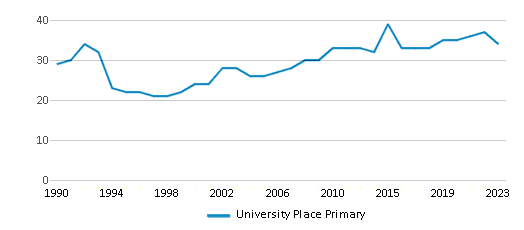
Students by Grade
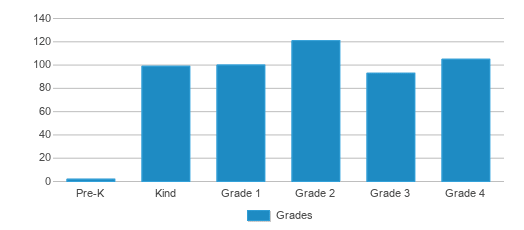
School Rankings
University Place Primary ranks within the top 20% of all 2,113 schools in Washington (based off of combined math and reading proficiency testing data).
The diversity score of University Place Primary is 0.72, which is more than the diversity score at state average of 0.69. The school's diversity has stayed relatively flat over five school years.
Overall Testing Rank
#213 out of 2113 schools
(Top 20%)
(Top 20%)
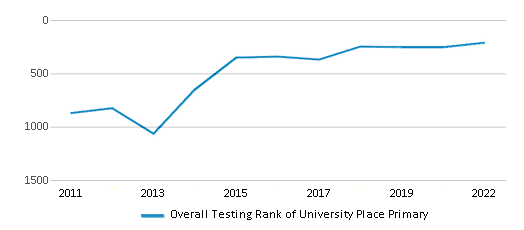
Math Test Scores (% Proficient)
65-69%
40%
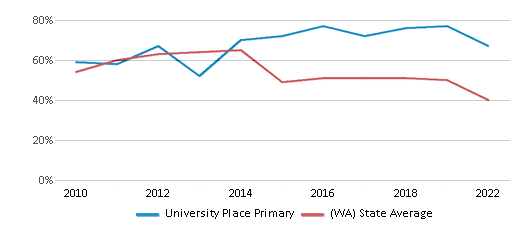
Reading/Language Arts Test Scores (% Proficient)
70-74%
53%
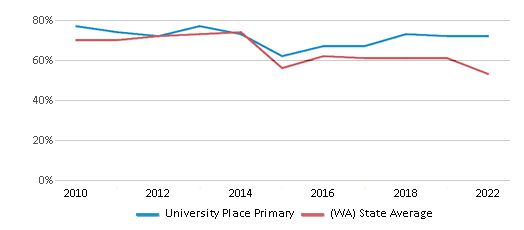
Student : Teacher Ratio
16:1
16:1
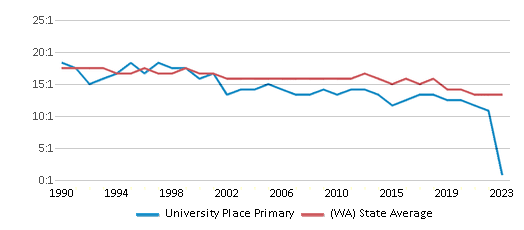
American Indian
n/a
1%
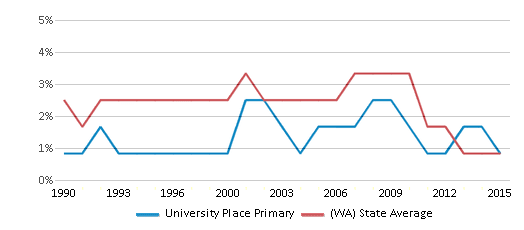
Asian
7%
9%
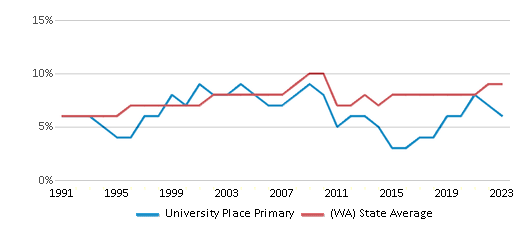
Hispanic
17%
26%
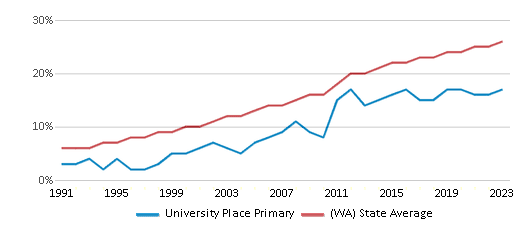
Black
11%
5%
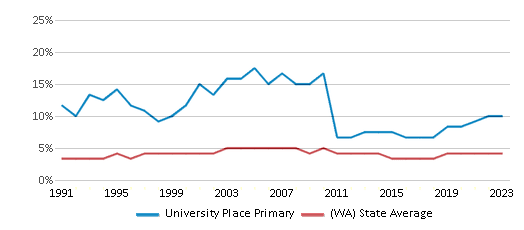
White
46%
48%
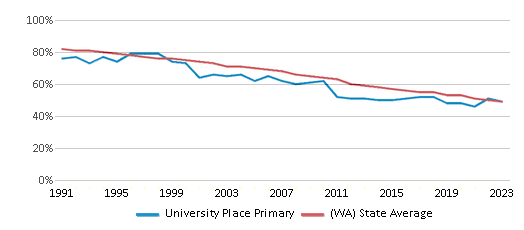
Hawaiian
2%
2%
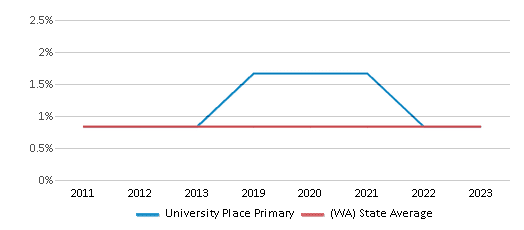
Two or more races
17%
9%
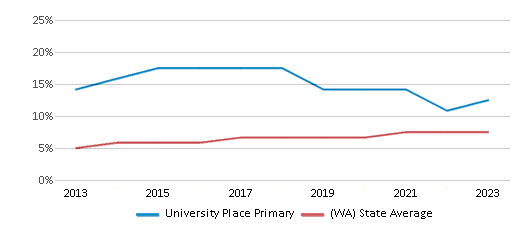
All Ethnic Groups
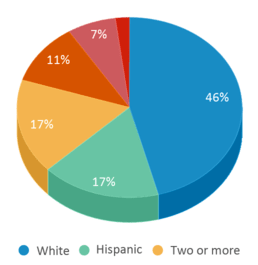
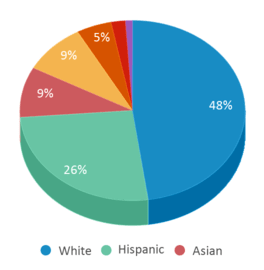
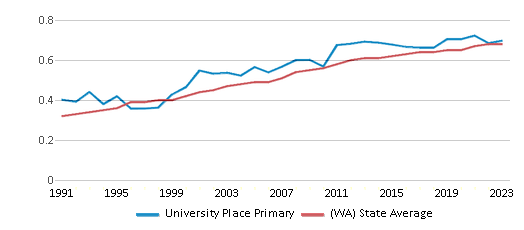
Eligible for Free Lunch
45%
49%
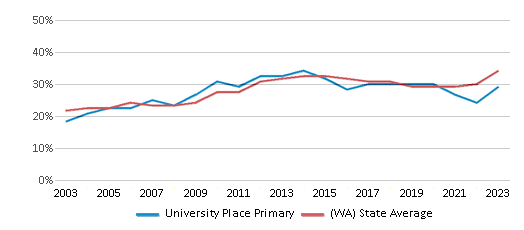
Eligible for Reduced Lunch
8%
8%
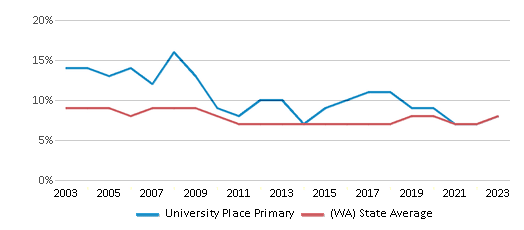
School Statewide Testing
School District Name
Source: National Center for Education Statistics (NCES), WA Dept. of Education
Profile last updated: 02/09/2025
Frequently Asked Questions
What is University Place Primary's ranking?
University Place Primary is ranked #213 out of 2,113 schools, which ranks it among the top 20% of public schools in Washington.
What schools are University Place Primary often compared to?
University Place Primaryis often viewed alongside schools like Sunset Primary by visitors of our site.
What percent of students have achieved state testing proficiency in math and reading?
65-69% of students have achieved math proficiency (compared to the 40% WA state average), while 70-74% of students have achieved reading proficiency (compared to the 53% WA state average).
How many students attend University Place Primary?
520 students attend University Place Primary.
What is the racial composition of the student body?
46% of University Place Primary students are White, 17% of students are Hispanic, 17% of students are Two or more races, 11% of students are Black, 7% of students are Asian, and 2% of students are Hawaiian.
What is the student:teacher ratio of University Place Primary?
University Place Primary has a student ration of 16:1, which is equal to the Washington state average of 16:1.
What grades does University Place Primary offer ?
University Place Primary offers enrollment in grades Prekindergarten-4
What school district is University Place Primary part of?
University Place Primary is part of University Place School District.
School Reviews
2 4/18/2022
this school is a mess. I am a real student that goes to this school. most of the teachers are good and empathic but, very few of them don't pay attention to your problems and just punish you for no reason. my teacher is a very good person which is good, most of the teachers are. now, let's talk about education. they make learning hard and stressful. on top of that, they have so many rules at recess. that makes you have bad thoughts during school, which can make it hard to concentrate. if the rules at recess were fun and made sense then we would be in a good mood instead of a bad one. not all the rules are bad though. like no stopping on the track, it makes sense since you don't wanna cause traffic. but, at morning assembly they want you to have a book out before it starts, BUT THEY DONT LET YOU EVEN FINISH A SENTANCE. so want even the point of getting the book out anyway. I would recommend coming to this school if they changed some rules. other than that is OK.
Review University Place Primary. Reviews should be a few sentences in length. Please include any comments on:
- Quality of academic programs, teachers, and facilities
- Availability of music, art, sports and other extracurricular activities
Recent Articles

What Is A Charter School?
Explore the world of charter schools in this comprehensive guide. Learn about their history, how they operate, and the pros and cons of this educational innovation. Discover key facts about charter schools, including admission policies, demographics, and funding, as well as what to look for when considering a charter school for your child.

10 Reasons Why High School Sports Benefit Students
Discover the 10 compelling reasons why high school sports are beneficial for students. This comprehensive article explores how athletics enhance academic performance, foster personal growth, and develop crucial life skills. From improved fitness and time management to leadership development and community representation, learn why participating in high school sports can be a game-changer for students' overall success and well-being.

February 05, 2025
Understanding the U.S. Department of Education: Structure, Impact, and EvolutionWe explore how the Department of Education shapes American education, from its cabinet-level leadership to its impact on millions of students, written for general audiences seeking clarity on this vital institution.






